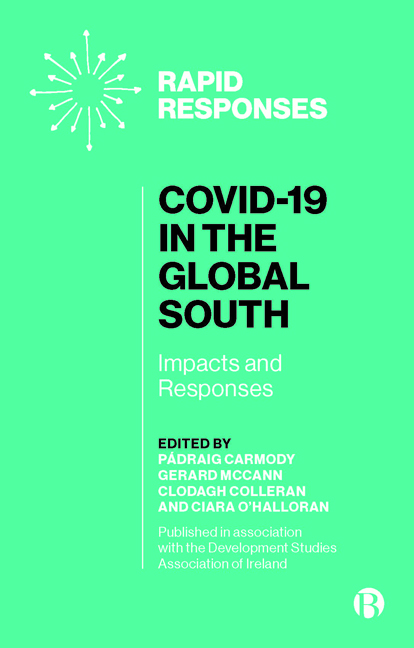15 - COVID-19 and Global Inequality
Published online by Cambridge University Press: 23 March 2021
Summary
The impact of the COVID-19 pandemic on the Global South will be formidable and will take decades to recover from. Regions that have historically struggled with development issues have been caught highly exposed to the spread of this particular pathogen. Already straining from under-resourced health and medical provision, climate change and conflict, many of the world's most vulnerable regions will be forced into a mitigation drain that will undermine decades of positive development while accelerating processes of socioeconomic stress that – if not combated at an international level – will lead to further damaging levels of economic decline and deprivation. This chapter will survey the effects that COVID-19 will have on socioeconomic inequality and will highlight the scale of the need vis-à-vis strategies for mitigation.
The new context
COVID-19 has brought forward a series of issues that will have both short-and long-term implications for international development. The various governmental attempts at mitigating the impact of this pandemic have served to highlight persistent systemic fault-lines in a global socioeconomic system where inequality has, yet again, come sharply into focus. The implications of this all too predictable pandemic have been manifest in various ways: through transnational market competition, the scramble for basic medical supplies; the deliberate neglect of the most vulnerable members of society; the pharmaceutical companies’ race for a vaccine; an almost total lack of testing and medical intervention in disadvantaged communities; fear of the virus being used as a cover for human rights abuses; and international organizational withdrawal when it comes to assisting regions of the world which do not have the health and public services to combat such desperate circumstances – this has been most notable in regions in conflict (Human Rights Watch, 2020).
Perhaps most notable in the confusion over mitigating actions has been the way in which governments, internationally, have sought to protect internal vested interests at the expense of confronting persistent, debilitating, global inequality. The pirating of global supplies of COVID-19 relief drugs by rich countries is perhaps the most shocking example of a breakdown in what was an unsteady consensus on global interdependence. The rollout of this economy of privilege can be witnessed most vividly from what has been happening to the poorest individuals, families, communities and Least Developed Countries (LDCs), and increasingly selective policies of development cooperation.
- Type
- Chapter
- Information
- COVID-19 in the Global SouthImpacts and Responses, pp. 161 - 172Publisher: Bristol University PressPrint publication year: 2020
- 7
- Cited by

